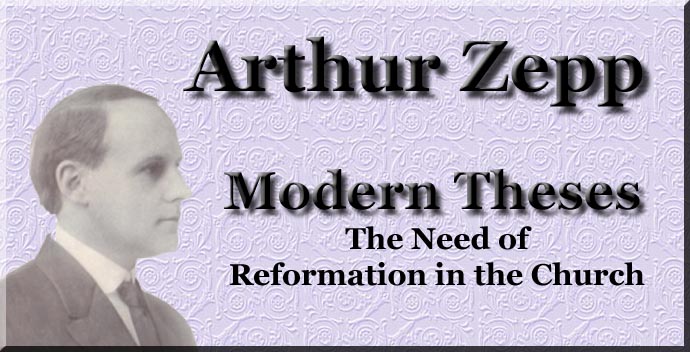
Modern Theses
The Need of Reformation in the Church
By Arthur Zepp
Introduction
|
It is not an easy matter to write an introduction to another man's book. One cannot always follow clearly, the vision of another. The author of the present book has a vision, he has brought errors in the religious field to light and truth-seekers will appreciate the effort of the writer to clear the atmosphere. There is still much religious bondage in the world. This book is an earnest attempt to lead the soul into the liberty of Christ. The author has uncovered a Christian Pharisaism (if such an expression can be used) and a religious legalism which must be broken. The book is an attempt to lead back to the simplicity of the Gospel, and what earnest thinker is there that has not recognized that need? The book is, to some extent, written in an epigrammatic style, and to some readers this may prove tedious, but there are some truths which cannot be expressed in any other way. The ideas expressed have come as a result of experience and contact in a busy ministry. If it should seem to some cautious thinkers that some of the statements are too radical, it must be remembered that all pioneer thought errs on the radical side. Dr. Bruce has said, "One rash, but heroic, Luther, is worth a thousand men of the Erasmus type, unspeakably wise, but cold, passionless, timid and time-serving." There is certainly nothing timid and time-serving about this book. It is frank, open and straight to the point. It is the style of the cataract and not of the placid river. It will make people think and will shake our quiet dogmatisms and disturb our settled traditions. It will not be pleasant reading for the dogmatist or the traditionalist. It will disturb our sectarianism and awake our somnambulism. This book aims at the conversion of our religious ideas. It is a call to get back to simplicity and to "rend our hearts and not our garments." It has a prophetic note in it and belongs to the Elijah type and not to the prophets of Baal. The book calls back to Christ; Christ is the center of the vision. It will appeal to those whose hearts are crying, "Sirs, we would see Jesus." It will not be necessary to endorse every statement the author has written to endorse the general trend of the book. The writer has been drinking at the fountain of Church History and he has seen the drift of the modern church and modern religious movements from the center of Christianity, which is Christ. He has been comparing notes and thinks the advantage is with the past Reformers. I think the ideal of the book could be summed up in those splendid words of Sir Robertson Nicholl in "The British Weekly" -- "The revelation is for us completed in Christ. It is God's love that carries forward His redeeming purpose for us all and one by one. Mercy to the Psalmist means more than pardon; it was kindness, loyal affection on the part of God, deep fatherly consideration. We need that, and we have it proved to us in Christ Jesus. We see in Him that God's power is most manifest in His love, in the moral sphere, not in the material; in His victory over sin and death, in His patience as He deals with the material of our faulty lives." I have read the manuscript of the book and feel that there is real merit in it. The book is a message rather than a treatise. Its whole purpose, as I understand it, is to bring us from our legal and traditional tendencies back to the central fact of Christianity -- Christ Jesus Himself. If it does this for any soul, it will have accomplished its mission to the Church. George Shaw |
|
 |
 |
|
|
|
-
Site Navigation
 Home
Home What's New
What's New Bible
Bible Photos
Photos Hiking
Hiking E-Books
E-Books Genealogy
Genealogy Profile
Free Plug-ins You May Need
Profile
Free Plug-ins You May Need
 Get Java
Get Java.png) Get Flash
Get Flash Get 7-Zip
Get 7-Zip Get Acrobat Reader
Get Acrobat Reader Get TheWORD
Get TheWORD